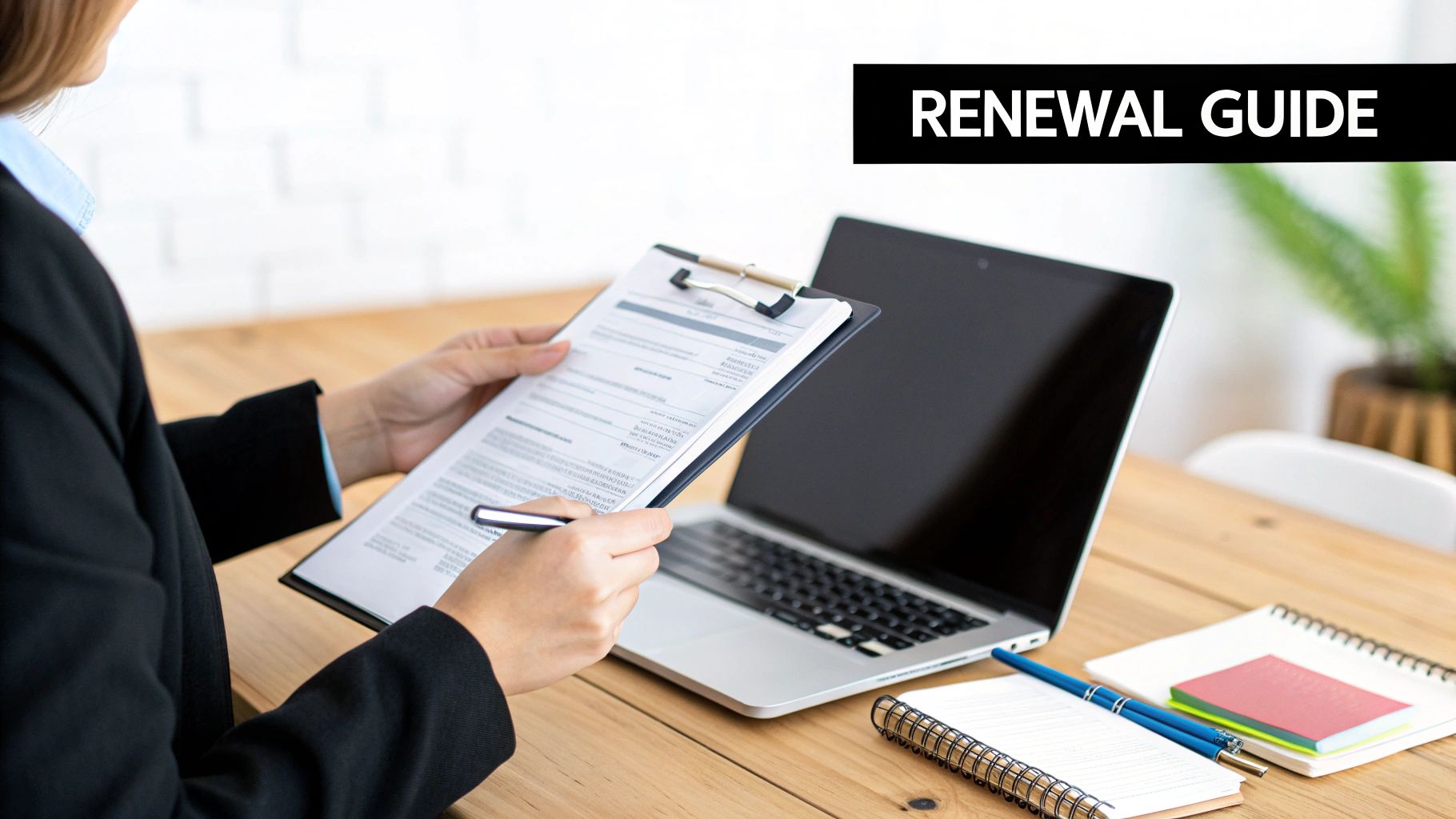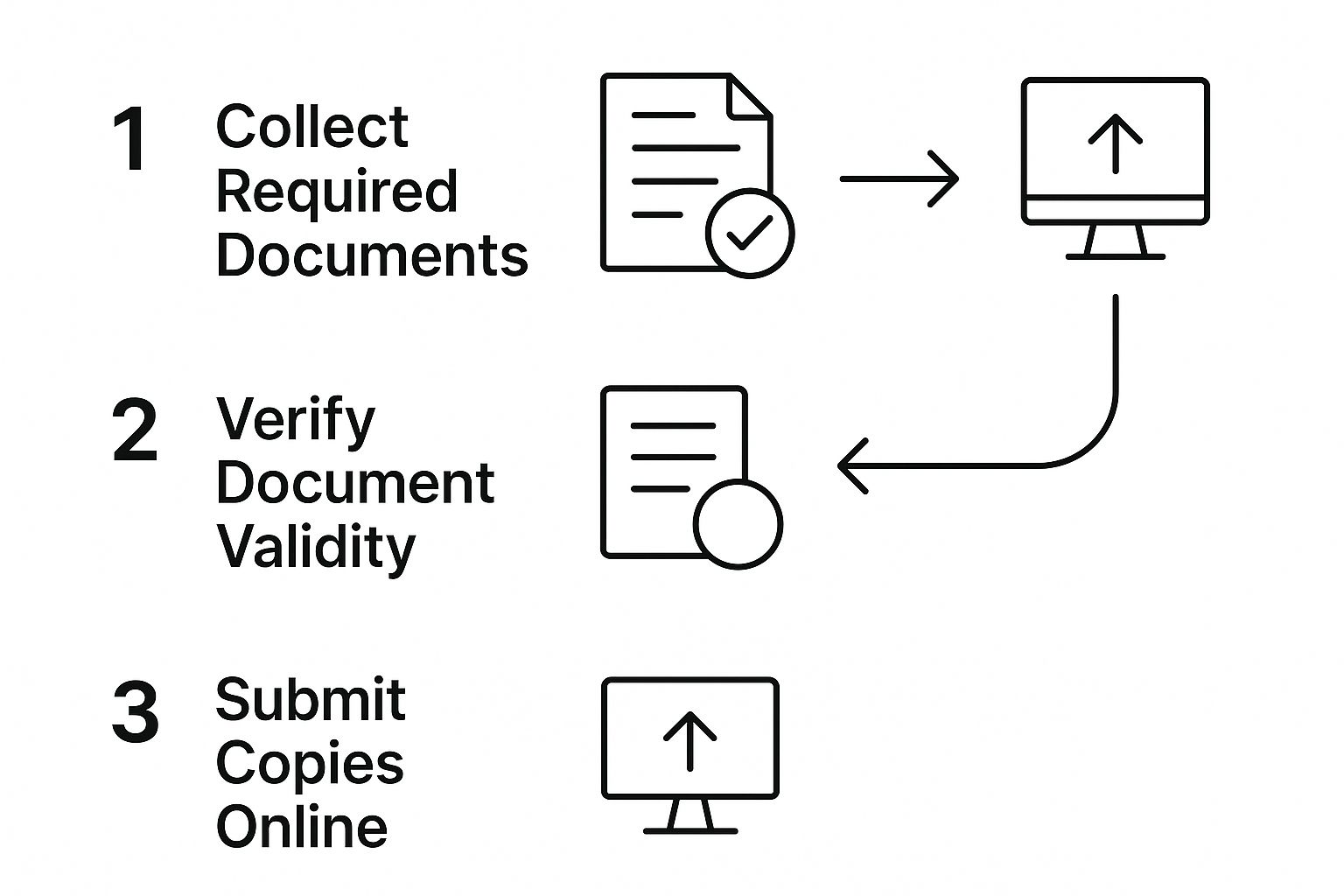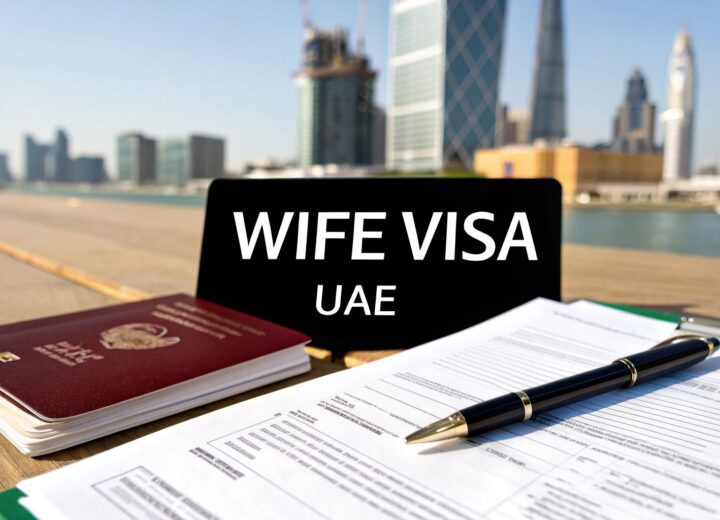Keeping your trade license up-to-date isn't just about ticking a box on your annual to-do list; it's the very foundation of your business's legality and continuity in the UAE. Think of it less as a bureaucratic chore and more as a crucial strategic move. Staying current protects your company from serious penalties, prevents operational freezes, and safeguards the reputation you've worked so hard to build.
In short, it’s what allows you to operate legally and chase opportunities without looking over your shoulder.
Why a Timely Renewal Is Non-Negotiable

In the UAE's dynamic economy, a valid trade license is the lifeblood of your business. Letting it expire isn't a minor slip-up—it's a critical mistake that can bring your operations to a grinding halt. The fallout can be severe, from hefty fines that rack up daily to having your company's bank accounts frozen. It also means you can't sponsor or renew employee visas, putting your entire team's residency at risk.
For both new entrepreneurs and established companies, staying compliant is the only way to tap into the full range of UAE tax advantages and maintain a good relationship with government bodies. An expired license immediately puts your business on the wrong side of the law, triggering a domino effect of problems that can take weeks, or even months, to sort out.
The Strategic Edge of Staying Compliant
Treating your license renewal as a top priority is essential for long-term success. It signals to partners, clients, and banks that you're a serious, reliable business committed to the local regulatory framework.
Here’s what staying on top of it gets you:
- Seamless Operations: With a valid license, you can keep trading, sending invoices, and getting paid without any legal hurdles.
- Visa Security: Your company’s license is directly linked to every employee and investor visa. If it lapses, so does their legal right to stay and work in the country.
- Full Access to Government Services: Need to clear goods through customs or bid on a government tender? An active trade license is a must.
- Stronger Credibility: A consistent renewal history shows stability. It tells potential investors, partners, and customers that you're here to stay.
One of the most common and costly mistakes we see is failing to renew on time. It usually boils down to a simple lack of planning, but the consequences—from frozen assets to being blacklisted—can be devastating for any business, whether it's on the mainland or in a free zone.
To help you keep track, here's a quick comparison of what the renewal process generally involves for mainland and free zone companies.
Renewal at a Glance Mainland vs Free Zone
| Consideration | Mainland Companies | Free Zone Companies |
|---|---|---|
| Governing Body | Department of Economic Development (DED) in the respective emirate. | The specific Free Zone Authority (e.g., DMCC, DAFZ, RAKEZ). |
| Key Documents | Ejari (tenancy contract) is mandatory; may need external approvals. | Office lease agreement from the free zone; may need an audit report. |
| Process | Standardised online portals like TAMM or Dubai Business, or through service centres. | Varies by free zone; each has its own online portal and procedures. |
| Fees | Generally higher, includes DED fees, Chamber of Commerce, and others. | Fees set by the free zone authority, often bundled with the lease. |
| Flexibility | Less flexible; strict adherence to DED regulations is required. | Can offer more flexibility, but you're bound by that free zone's specific rules. |
While the specifics differ, the core principle is the same: planning ahead is essential to avoid disruption.
A Market That Demands Compliance
The UAE's business landscape is growing faster than ever, which means regulatory compliance is becoming even more critical. By late 2024, the nation hit a record high of over 1.5 million active commercial licenses, a surge fueled by major economic reforms.
The numbers from 2024 alone paint a clear picture: Abu Dhabi saw a 27% jump in renewals, Sharjah processed over 46,000 by the third quarter, and Ajman hit an incredible 131,380 renewals. This isn't just growth; it's a clear signal that the government is focused on maintaining a well-regulated and orderly market.
Our hands-on experience as specialists in Mainland Company Formation in Dubai, Sharjah & Abu Dhabi has shown us that getting things right from day one is key. The habits you form when you first learn how to start a business in the UAE will set the tone for all future compliance. By working with our specialists in Corporate PRO Services, you can offload this critical task to experts who handle it flawlessly, backed by our 24/7 Support Service. We offer Cost-Effective Business Setup Solutions designed to protect your investment and let you focus on what you do best—running your business.
Navigating Renewal in Dubai, Abu Dhabi, and Sharjah
Renewing your trade license in the UAE isn't a one-size-fits-all task. It’s a landscape with different paths depending on where your business is set up. Whether you're on the mainland in Dubai, Abu Dhabi, or Sharjah, or operating from one of the many free zones, the steps you'll need to follow will change. Getting a handle on these differences is the first real step to a smooth, hassle-free renewal.
For mainland companies, the process is generally managed by the Department of Economic Development (DED) for that specific emirate. They've rolled out some pretty sophisticated online portals to make things more efficient. On the flip side, if you're in a free zone, you'll deal directly with your zone's authority. Each one has its own rulebook, online system, and list of required documents.
This core difference means you can't just follow a generic guide. A business owner on the Dubai mainland has a completely different set of hoops to jump through compared to an entrepreneur in a Sharjah free zone.
The Mainland Renewal Workflow
For businesses operating on the mainland, renewing your license has become an increasingly digital affair. Authorities in Dubai, Abu Dhabi, and Sharjah have invested heavily in online platforms that bring the whole process under one roof—from the first reminder to the final payment and getting your new license.
Typically, it all starts with an automated notification, usually an SMS or email, letting you know your license is about to expire. That’s your signal to get your documents ready. The two most important pieces of paper you'll need are a copy of your current trade license and, critically, a valid tenancy contract registered with Ejari. This is non-negotiable for mainland businesses and, frankly, where many renewals hit a snag if it's not sorted out correctly.
Once your documents are in order, you'll submit them through the relevant government portal. After that, a payment voucher is generated. This voucher breaks down all the fees: DED charges, Chamber of Commerce fees, and any other costs specific to your market or business activity. Pay that, and your renewed trade license is issued electronically. You can just download and print it.
Free Zone Renewal: A Different Ball Game
Renewing a license in a free zone has a similar goal but comes with its own procedural quirks. Each free zone—whether it's DMCC in Dubai, RAKEZ in Ras Al Khaimah, or SAIF Zone in Sharjah—acts as its own little regulatory world. This independence means their renewal processes are built around their specific rules.
For example, a trading company in Jebel Ali Free Zone (JAFZA) might have to submit an annual audit report with its renewal application. That’s a requirement you won’t always find for a consultancy in Dubai Media City. The process usually kicks off by logging into the free zone’s dedicated online portal, where you’ll fill out a renewal form and upload updated documents, which nearly always includes the renewed lease for your office or facility inside the zone.
The fee structure can sometimes be simpler, too. You might get a single annual invoice that bundles the license, lease, and other admin charges together. The trick is to know your specific free zone's rulebook inside and out, because what applies in one zone probably won't in another.
Our experience handling renewals across dozens of jurisdictions has taught us one crucial lesson: assumptions are costly. Always check the latest requirements directly with the authority. Regulations can and do change, and relying on last year’s process is a classic mistake that leads to completely avoidable delays.
This simplified flow shows the core steps for most renewals, whether you're mainland or free zone.

This visual just highlights that no matter the jurisdiction, the basic steps of gathering documents, getting them verified, and submitting the application stay the same.
Real-World Renewal Scenarios
To really see the differences, let’s look at two distinct scenarios.
First, imagine a professional services firm on the Dubai mainland. Their renewal is all about having a valid Ejari and possibly getting approvals from external bodies related to their field. The whole thing is done through the DED's online portal, with clear, itemised fees.
Now, compare that to an e-commerce business operating out of a Sharjah free zone. Their main requirement is a valid lease agreement directly with the free zone authority. They likely won't need any external approvals, and their renewal is managed entirely through the free zone's own portal. The fees will probably come as one consolidated invoice from the free zone itself.
For companies in Dubai, Abu Dhabi, and Sharjah that are also involved in international trade, knowing the ins and outs of things like customs clearance procedures is just as critical for smooth operations. Just like with license renewals, staying compliant in these related areas is vital to keeping your business running without interruption.
Whether you decide to tackle the renewal yourself or bring in an expert, understanding these nuances is key. Our Corporate PRO Services are designed to handle these complexities for you. As specialists in Freezone Company Formation across the UAE, we ensure every detail is handled correctly, saving you from expensive mistakes. And with our 24/7 Support Service, we're always here when you need us.
Your Essential Document Checklist for a Smooth Renewal

Let's be honest, getting your paperwork in order is the most tedious—and critical—part of renewing your trade license. A single missing document or an incorrect form can bring the entire process to a screeching halt, leaving you facing delays and potential fines. It’s not just about knowing what to submit, but why it’s needed.
In our years of handling renewals for businesses across Dubai, Abu Dhabi, and Sharjah, the number one culprit for delays is almost always disorganised paperwork. We’ve seen it all. A common one is the business owner who only realises their tenancy contract expired last month when they're already trying to submit their renewal. This simple oversight triggers a frantic rush to sort out the lease and Ejari, pushing the whole timeline back by weeks.
To help you sidestep these common headaches, we've broken down the documents into two key groups: the core requirements everyone needs, and the specialised paperwork that applies to certain business activities.
Core Documents for Every Renewal
Think of these as the absolute non-negotiables. Whether you’re running a mainland trading company or a free zone consultancy, you will almost certainly have to provide these to the authorities.
- A Typed BR/1 Form: This is the official application for your license renewal. Make sure it's typed, filled out with 100% accuracy, and signed by an authorised person in your company.
- A Copy of Your Current Trade License: Simple enough—the authorities need a clear copy of the license you're looking to renew.
- Photocopies of All Business Partners' Passports: Go through the list of partners on your license and ensure you have a valid, clear passport copy for every single one.
Getting these basic documents organised and ready is your first real step toward a hassle-free renewal.
The Critical Role of Your Tenancy Contract
For any mainland business, a valid tenancy contract registered with Ejari is everything. This is your proof of a physical office space that meets the standards of the Department of Economic Development (DED). The Ejari system directly links your lease to your trade license, and if that registration isn’t valid and active, your renewal application will be flat-out rejected.
A crucial tip from our PROs: Always try to align the expiry dates of your tenancy contract and your trade license. If your lease expires even a day before your license, you can't renew. We always advise clients to kick off this process at least 45 days before expiry.
Free zone companies have a similar rule. Instead of an Ejari, they need a valid lease agreement issued directly by their free zone authority, confirming they have the right to operate there.
Specialised Paperwork for Certain Activities
Now we get into the specifics. Beyond the core list, some businesses need extra approvals or certificates depending on their industry. This is often where things get tricky and where professional guidance can save you a lot of time and stress.
A healthcare clinic in Dubai, for instance, will need fresh approvals from the Dubai Health Authority (DHA). An engineering consultancy might require a No Objection Certificate (NOC) from the municipality. An NOC is just a formal letter from an authority stating they have no issue with your company performing its licensed activities.
Knowing these nuances is key. If you want to learn more, our guide on what an NOC is in the UAE is a great resource that explains why it's so important for regulated industries.
Here are a few common examples of specialised documents you might need:
- External Government Approvals: If your business is in education, finance, transport, or food trading, you'll need renewal approvals from the relevant ministries or municipal bodies.
- Shareholder or Board Resolutions: Have there been any changes to your company’s ownership or management? You may need a formal resolution to document this.
- Annual Audit Reports: Some free zones, especially those focused on finance or trading, require companies to submit an audited financial report as part of their renewal packet.
Our team of corporate PROs are specialists in Corporate PRO Services and Attestation Services, spotting these specific needs early in the game. We help our clients manage everything from getting foreign documents attested to securing the right NOCs, making sure nothing gets missed. With our 24/7 Support Service, we're always here to keep your renewal moving forward—a cost-effective way to save yourself a ton of time and stress.
Decoding the Costs of Your License Renewal

Let's talk numbers. When it comes to your trade license renewal, understanding the full financial picture is crucial for budgeting and avoiding any last-minute surprises. The final figure on your payment voucher isn't just one single amount; it’s a combination of several different charges, each going to a specific government body or for a particular service.
Getting a clear view of this breakdown helps you plan your cash flow and ensures you’re not caught off guard when the bill arrives.
At its core, the cost includes a base fee from the relevant economic department, like the DED in Dubai. But that’s just the starting line. Several other mandatory charges get added on top, creating a final cost that can vary massively from one business to the next.
Breaking Down the Key Fee Components
To really get a handle on your renewal expenses, you need to look past the main license fee. The total amount you'll pay is a mix of several distinct charges, especially if you're set up on the mainland.
Here’s a quick rundown of the most common fees you can expect:
- Base Renewal Fee: This is the primary charge from the economic department for the license itself.
- Chamber of Commerce Fee: A mandatory annual fee paid to the Chamber of Commerce in your emirate.
- Market Fees: For mainland companies, this is a big one. It's often calculated as a percentage of your office or shop's annual rent.
- Activity-Specific Charges: Some business activities, particularly in regulated fields like healthcare or engineering, come with extra fees for approvals from various government ministries.
The single biggest variable in renewal costs for mainland companies is almost always the Market Fee. Since it's tied directly to your rental value, a business in a prime Dubai location will pay substantially more than one in a less central area—even if their core business is identical.
Getting to grips with these components is the first step. For a deeper dive, our detailed guide on the trade license cost in Dubai breaks it all down even further.
Sample Dubai Renewal Cost Breakdown
To give you a clearer idea, the table below shows some estimated renewal costs for different business types in Dubai. Notice how much the jurisdiction and nature of the business affect the final price tag.
| Business Type | Jurisdiction | Estimated Renewal Fee Range (AED) |
|---|---|---|
| Professional Services Firm | Dubai Mainland (with office) | 12,000 – 25,000 |
| General Trading LLC | Dubai Mainland (with warehouse) | 18,000 – 35,000+ |
| E-commerce / Tech Startup | Free Zone (e.g., DMCC, DAFZ) | 10,000 – 20,000 |
| Freelance Permit | Free Zone (e.g., GoFreelance) | 7,500 – 15,000 |
As you can see, the difference can be substantial. These figures are just estimates, but they highlight why a one-size-fits-all approach to budgeting for renewals simply doesn't work.
Cost Differences: Mainland vs. Free Zone
The financial commitment for renewal is worlds apart when you compare mainland and free zone setups.
Let's look at a couple of real-world scenarios.
Scenario 1: A Large Trading Company on Dubai Mainland
This business runs from a large warehouse and office. Its renewal bill will include a hefty DED fee, a high Chamber of Commerce charge, and a significant market fee based on its high rent. The total renewal cost could easily hit anywhere from AED 15,000 to AED 30,000, or even more.
Scenario 2: A Small E-commerce Startup in a Sharjah Free Zone
This startup probably works from a flexi-desk or a small office. Its renewal fee is a single, predictable amount paid directly to the free zone authority. It's often bundled into a package covering the license, establishment card, and facility access. Here, the total cost is much more manageable, typically falling between AED 8,000 and AED 15,000.
Government Initiatives and Smarter Solutions
The good news? UAE authorities are constantly looking for ways to make the business environment more affordable, and savvy entrepreneurs can find some serious savings.
A perfect example is the recent move by the Abu Dhabi Global Market (ADGM). Starting January 1, 2025, ADGM rolled out major fee reductions. Renewal fees for non-financial companies were slashed by 37.5%, dropping from USD 8,000 to USD 5,000. The retail sector got an even better deal with a 50% cut, seeing fees fall from USD 4,000 to just USD 2,000. You can read the full details in the ADGM's official announcement.
Navigating these costs and taking advantage of such initiatives is exactly where our expertise comes in. We offer Cost-Effective Business Setup Solutions tailored to your needs. Our team helps you sidestep hidden charges and, more importantly, the steep fines that come from payment delays, ensuring your trade license renewal stays firmly on budget.
Common Renewal Mistakes and How to Avoid Them
Drawing from thousands of successful renewals, our team has seen pretty much every mistake that can derail the process. A simple oversight can quickly snowball into a costly problem, complete with fines and even an operational freeze. Understanding these common pitfalls is the first step toward a smooth, stress-free trade license renewal.
Many business owners treat renewal as a last-minute chore, only to get tangled in a web of complications. Let's walk through the most frequent errors we see and give you some solid advice to help you sidestep them, keeping your business compliant and running without a hitch.
Miscalculating Critical Timelines
The most common mistake, hands down, is just starting too late. People often underestimate how long it takes to pull everything together, especially if you need approvals from other authorities or have to sort out a new tenancy contract. Waiting until the last week is a recipe for disaster.
We recently handled a case for a mainland trading company in Dubai that perfectly illustrates this. Their trade license was due on the 30th of the month, but their Ejari had actually expired on the 23rd. They kicked off the renewal process on the 25th, and the DED portal automatically rejected it. That small gap in dates triggered daily fines and a week-long scramble to get their lease renewed, costing them both time and money.
Our rule of thumb? Start the renewal process at least 30 to 45 days before your licence expires. This buffer gives you plenty of breathing room to fix any unexpected issues without the pressure of a looming deadline.
This proactive approach turns renewal from a frantic rush into a predictable administrative task. To cut down on these kinds of errors and streamline your compliance, it's worth applying principles for improving business efficiency to your internal workflows.
Overlooking Incomplete or Outdated Documents
Submitting an incomplete document file is another frequent roadblock. It’s not just about having the right documents; they also have to be current and correctly formatted. This is where small details can cause big delays.
Some of the most common document-related errors we see are:
- Expired Passports: A shareholder's passport copy has recently expired, but it's submitted anyway.
- Incorrect Signatories: The renewal form is signed by a manager who isn't legally authorised on the trade license.
- Missing External Approvals: Forgetting to get a renewed No Objection Certificate (NOC) from a specific regulatory body that oversees your business activity.
Not long ago, we assisted a free zone consultancy that had added a new partner mid-year. When it was time to renew, they submitted the old memorandum of association, completely forgetting the updated version. The free zone authority, of course, rejected the application. This forced them to formally amend their company records before they could even think about renewing, pushing the whole process back by two weeks.
Forgetting to Update Company Records
Your trade license is a living document. It has to accurately reflect your business's current reality. Any significant change that hasn't been officially recorded will bring your renewal to a grinding halt.
Think about these common scenarios:
- Change of Address: Did you move to a new office this year? If you didn't formally amend your license with the new address and Ejari, your renewal will fail. Simple as that.
- Change in Business Activity: If you've started offering new services that aren't listed on your license, you have to add that activity officially before you can renew.
- Updated Contact Information: Using an old mobile number or email can mean you miss the official renewal notifications from the authorities, leading to an unintentional and costly lapse.
One of our clients, a tech startup in Abu Dhabi, changed its general manager but never bothered to update the details with the economic department. When they went to renew, the system flagged a mismatch between the signatory on the application and their registered records. Fixing this required a formal amendment process, adding a layer of complexity and cost that was completely avoidable.
Our Corporate PRO Services are designed to prevent these exact issues. By managing your company file proactively and providing 24/7 Support Service, we ensure all your records are current long before it's time for your trade license renewal. This is part of our cost-effective solution to keep your business running smoothly, helping you avoid the stressful errors that catch so many others unprepared.
Your Top Licence Renewal Questions Answered
When you're focused on the day-to-day of running your business, navigating the specifics of a UAE trade licence renewal can feel like one more thing on an already long to-do list. We get it. That's why we've put together some quick, straightforward answers to the most common questions we hear from entrepreneurs just like you.
Think of this as your go-to guide for handling those tricky renewal challenges without the headache.
What Happens if I Miss My Renewal Deadline?
Let's be blunt: missing the deadline is not an option. The moment your licence expires, penalties start kicking in. Depending on your jurisdiction, these fines can be charged daily or monthly, and they add up surprisingly fast.
But the financial hit is just the start. An expired licence means your business is operating illegally. This can lead to serious consequences, like having your company’s bank accounts frozen or being unable to sponsor or renew employee visas. In the worst-case scenario, your company could even be blacklisted by the authorities, making any future business operations a nightmare. This is exactly why we always push our clients to start the renewal process well before the expiry date looms.
How Much Should I Budget for Renewal?
This is the million-dirham question, and the answer is: it depends. The costs can vary quite a bit based on your business type, where you're set up (mainland or a free zone), and even the size of your office.
Just to give you a ballpark figure, renewing a trade licence in Dubai during 2025 will typically set you back anywhere from AED 3,500 to AED 18,000. The final amount hinges on factors like your specific business activity and location. To know for sure, you’ll need a payment voucher from the relevant authority, which breaks down all the charges. You can get more insights into renewal costs in Dubai on arnifi.com.
Our team makes sure you get a crystal-clear cost breakdown from the very beginning, so you won’t be hit with any nasty surprises down the line.
Believe it or not, the single biggest reason for budget blowouts during renewal is getting hit with fines for being late. Staying ahead of your renewal isn't just about staying compliant—it's the smartest financial move you can make.
Can I Renew My Licence if My Office Lease Expired?
The short answer is a firm no. For any mainland company, having a valid tenancy contract registered with Ejari is non-negotiable for renewal. If you're in a free zone, you'll need a current lease agreement directly with that free zone's authority.
If your lease runs out before your trade licence does, your renewal application will be rejected flat out. It's crucial to get your office lease sorted and renewed before you even think about starting the licence renewal process.
Do I Need an Auditor's Report to Renew?
This is a big one, and it really comes down to your jurisdiction and what your company does. Most mainland companies can breathe easy—they don't need an annual audit for their licence renewal.
However, it's a different story for many free zones. Authorities like DMCC and JAFZA often require certain companies to submit a professionally audited financial statement as a key part of their renewal package. The best advice? Check your specific free zone’s regulations well in advance so you have plenty of time to get an audit done if needed.
Can I Change My Business Activities During Renewal?
This is a common point of confusion. You can't actually change your business activities as part of the renewal itself. Adding, removing, or tweaking an activity requires a formal licence amendment, which is a completely separate process.
You have to get this amendment completed and officially approved before you can renew your licence with the updated activities. Trying to renew while doing business outside the scope of your current licence can land you in hot water with fines. Always make sure your licence is a perfect match for what your business is actually doing.
At PRO Deskk, we take the complexity out of compliance. Our expert team are specialists in Mainland and Freezone Company Formation, Corporate PRO Services, and visa solutions like the Golden Visa on Property and Investor Visa. We are here to ensure you can enjoy UAE Tax Benefits for International Entrepreneurs and that your business stays compliant without the hassle.
✅ 24/7 Support Service – Always here when you need us.
✅ Cost-Effective Business Setup Solutions tailored to your needs.
📞 Call Us Now: +971-54-4710034
💬 WhatsApp Us Today for a Free Consultation





